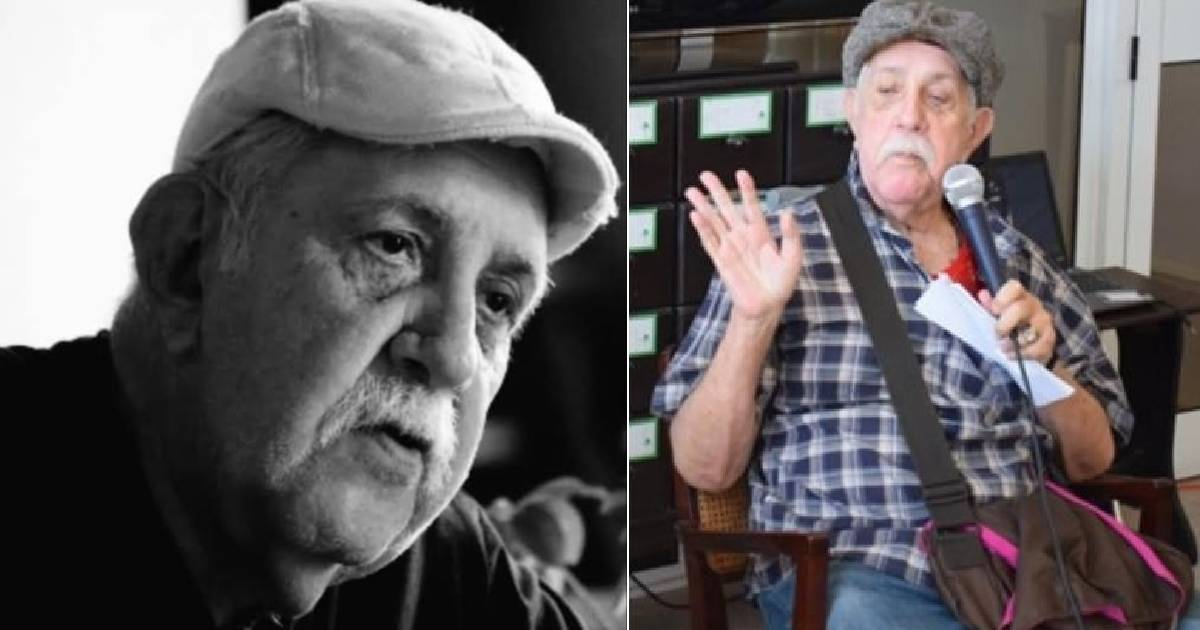
Related videos:
This past Tuesday in 2024, the National Center for the Performing Arts (CNAE) of Cuba confirmed the passing of Roberto Gacio, a renowned actor, theater critic, and researcher, at the age of 83. His departure has caused a wave of sorrow within the artistic community in Cuba and around the world.
"Sad morning for the Cuban scene. We mourn the loss of Roberto Gacio (1941-2024), an actor, theater critic, extensive researcher, and tireless creator, deeply cherished in our theatrical community," they wrote on the CNAE's Facebook profile.
Film director Luis Lacosta, a close friend and collaborator of Gacio, expressed his sadness on social media.
"What a year-end! There can be no more sadness; another dear friend is leaving me. In our personal meetings or phone calls, we were always proud of one another and knew we were the oldest founders of UNEAC. Roberto, I will always remember you with great affection, and I will surely imagine a call from you every day," he declared.
The young theater director Carlos Daniel Sarmiento Barlet expressed his thoughts on Gacio's passing: “I received the news of my beloved Roberto Gacio's loss with great sorrow. 'The encyclopedia of Cuban theater.' A great researcher, critic, and actor. My mentor and friend. Someone generous, noble, and always ready to help the young.”
Sarmiento Barlet also reflected on the impact Gacio had on his own career: “My first book, The Long Journey to Truth, is the result of his kindness and everything he was able to reveal to me, without expecting anything in return. I had the immense pleasure of writing the foreword to his memoir, and that will always remain one of my great professional satisfactions. Cuban theater has lost someone who, without the necessary recognition, has been indispensable. Safe travels, Gacio. Light to you. Thank you for so much.”
Gacio, who holds a degree in Hispanic Language and Literature from the University of Havana and in Performing Arts from the Higher Institute of Art, left an indelible mark on several generations of artists and scholars. His research on the Cuban stage addresses fundamental topics such as the 20th-century theatrical repertoire and acting practices, solidifying his position as one of the foremost scholars of theater in Cuba.
He was associated with some of the most important theater groups on the island, such as the legendary group Los Doce and Teatro de la Luna. Additionally, he was a renowned interpreter of the works of playwright Virgilio Piñera, bringing their complexity to life with mastery.
In addition to his acting career, Gacio devoted part of his life to teaching, giving classes and lectures at prestigious institutions. His courses covered topics such as acting, the history of Cuban and universal theater, costume history, children's theater, and body expression, training several generations of artists.
As a theater critic, his analyses enriched prestigious cultural publications in Cuba. An active member of the Criticism and Research Section of the Association of Performing Artists of Uneac, Gacio regularly participated in panels and colloquiums, leaving his mark on the academic and professional theater landscape.
His contribution to Cuban culture was acknowledged with numerous awards, including the Distinction for National Culture in 2002 and the Youth Master Award granted by the Asociación Hermanos Saíz in 2020.
Frequently Asked Questions about the Death of Roberto Gacio and Its Impact on Cuban Culture
Who was Roberto Gacio and what was his contribution to Cuban theater?
Roberto Gacio was a prominent Cuban actor, theater critic, and researcher known for his contributions to the Cuban theater scene over several decades. He was a renowned interpreter of Virgilio Piñera's works and was associated with important theater collectives such as Los Doce and Teatro de la Luna. Additionally, Gacio was an influential mentor for new generations of artists in Cuba.
What was the reaction of the artistic community to the death of Roberto Gacio?
The artistic community of Cuba and the world expressed deep sorrow over the death of Roberto Gacio. The National Center for the Performing Arts (CNAE) and individuals such as Luis Lacosta and Carlos Daniel Sarmiento Barlet conveyed their sadness and admiration for Gacio on social media, highlighting his generosity and legacy in Cuban theater.
What awards and recognitions did Roberto Gacio receive throughout his career?
Roberto Gacio has received numerous awards, including the National Culture Distinction in 2002 and the Maestro de Juventudes Award granted by the Asociación Hermanos Saíz in 2020. These recognitions reflect his significant contribution to Cuban culture and theater.
How has Cuban culture been affected by censorship and political restrictions?
Cuban culture has faced significant challenges due to censorship and political restrictions. Artists like Carlos Massola have been excluded for their civic stance, and theatrical works such as those by El Ciervo Encantado have been censored by the regime, limiting freedom of expression and artistic creation on the island.
Filed under: